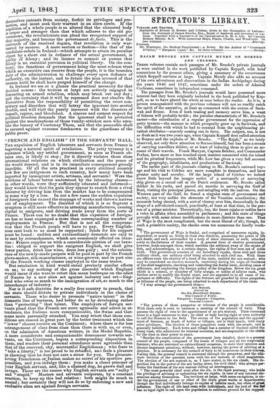"FRENCH AND ENGLISH" IN THE SERVANTS' HALL. THE expulsion of
English labourers and servants from France is begetting a natural spirit of retaliation. The petty tyranny is a nuisance which any settled government, as soon as France ob- tains one, is likely to stop ; for it directly violates those close international relations on which civilization and the peace of the world depend, and is in its immediate consequences grossly impolitic. Of all the arts practised in every civilized country how few are indigenous to each country, how many have been imported by immigrant artists, artisans, and servants! Were the relations of labour better understood by the labouring classes— in other words, were they sufficiently educated and informed— they would know that the gain they appear to snatch from a rival labourer by driving him from the market has to be compensated in some way by a loss. In not a few cases the sudden expulsion of foreigners has caused the stoppage of works and thrown natives out of employment. The disorder of which it is so flagrant a symptom is still more effective in arresting manufactures, causing capital to emigrate, and driving trade away from the ports of France. There can be no doubt that this expulsion of foreign- ers has at least expunged a more than corresponding number of employments in France. But that is not all the compensa- tion that the French people will have to pay. Every English- man sent back to us must be supported ; funds for his support must be found : sudden and extraordinary demands are only to be met by retrenchments, which are commonly effected on luxu- ries : France supplies us with a considerable portion of our luxu- ries : obliged to support the emigrant English, we shall give fewer parties, drink less wine, dress less gaily ; and the subsist- ence of the newly-made paupers will be paid in part by the French glove-maker, silk-manufacturer, or wine-grower, and in part also by the French working classes employed in the same trades.
But retaliation in kind would entail precisely similar effects on us .. to say nothing of the gross discredit which England would incur if she were to retort this mean burlesque on the edict of Nantes by a new alien act against industry and art—Eng- land who owes so much to the immigration of art, so much to the interchange of industry. Nor is it safe doctrine for a really free country to preach, that the state should dictate to private individuals in the choice of servants. Those who desire to promote " native talent " in the domestic line of business, had better do so by developing rather than " protecting " that talent. The employers of foreign ser- vants plead that the French are more agreeable and adroit in at- tendance, the Italians more companionable, the Swiss and Ger- mans more personally attached. You may retort that those con- ditions are caused in great part by the better treatment which the " lower" classes receive on the Continent; where there is far less estrangement of class from class than there is with us, or even, on the admission of American writers, in the Model Republic. A more considerate and companionable demeanour towards ser- vants, on the Continent, begets a corresponding disposition in them, and renders their personal attendance more agreeable than that of the reserved, shy, mistrustful Englishman ;• who fears to " take a liberty," is too proud to be rebuffed, and feels a pleasure in showing that he does not care a straw for you. The pleasure- loving Frenchman or.ltalian makes no secret of his sportive pro- pensities, and you indulge them : you make a closer prisoner of your English servant, and, like a chained dog, he grows dull and savage. These are the causes why English servants are "sulky " and
savage. Masters and servants cooperate, by a constant reaction, to keep up this bad relation : both might do much to amend ; but certainly they will not do so by enforcing a new and exclusive alien act against foreign servants.


























 Previous page
Previous page